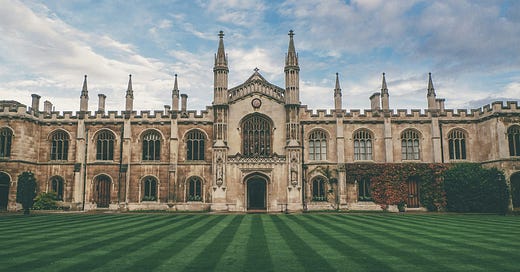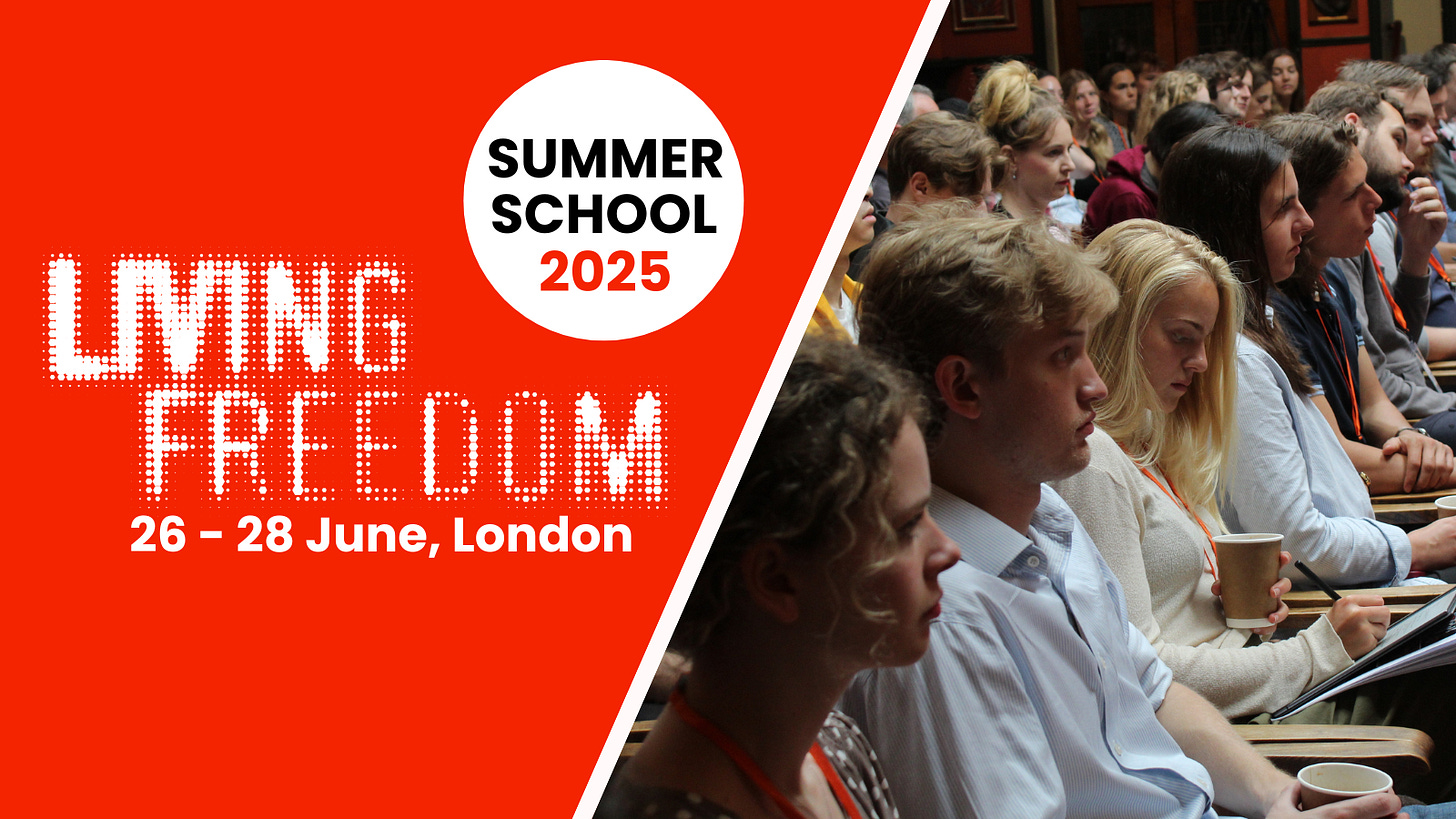The universities: what is to be done?
We're delighted to publish an edited version of Sam Rubinstein's introduction at the recent Living Freedom forum, 'Reclaiming the University from the Culture Wars'.
University education has become ‘infantilised’. So declared the academic David Butterfield in his acclaimed explanation as to why, after 21 years studying and teaching Classics, he felt compelled to resign from the University of Cambridge. In his eyes, such is the decline of British universities that it is no longer possible to fulfil the commitment to excellence in higher education
At Reclaiming the University from the Culture Wars, our recent salon hosted in partnership with Student AFAF, panellists Lara Brown, Jaiden Long and Sam Rubinstein insightfully grappled with the question as to what has fuelled the decline of universities. In the discussion, speakers and audience alike reflected on how students, academics and universities should respond to today’s predicament: that universities seem to have rejected the possibility or even desirability of the risk-taking, critically engaged, intellectually autonomous student.
Below we publish an edited version of Sam Rubinstein’s talk that throws down the challenge ‘Make Academia Difficult Again’.
And in our forthcoming summer school, several talks and debates will reflect on how we shed the view of young people as vulnerable individuals in need of protection and instead reassert a sense of agency and autonomy. More details of the event and how to apply can be found here. No one aged 18 to 30 should miss out on this event. Do apply now to join us and make sure you are part of the debate.
The universities: what is to be done?
Sam Rubinstein
Last month, wishing to keep abreast of cutting-edge research on the Middle Ages, I picked up the latest issue of Speculum, America’s premier journal of medieval studies. In the introduction, the editors – one of whom, Professor Roland Betancourt, is best known for his 2020 book Byzantine Intersectionality – crow about how wonderful it is that ‘all of the (named) authors’ in the issue ‘identify as women’.
With that in mind, the contributions that follow are about what you’d expect. One article describes how American medievalists need to ‘com[e] to terms with the legacies of settler colonialism’ by ‘evok[ing] the “framework of joy” that informs… decolonization’. Another rejoices that ‘medieval studies is experiencing an Indigenous turn’. Another praises ‘experimentation with forms of research presentation’ – including ‘drag performance’ and ‘bodysurfing lessons’. At that point, I seriously wondered whether I was reading a Titania McGrath spoof, or fallen for a Sokal hoax, but I promise this is all real.
What I found especially grating was the pro forma incantation of various dogmas. One essay begins with a land acknowledgement. Still another contains the footnote: ‘Note this article is not trans exclusionary: trans women are women.’
As I read this, I was hit by the same series of thoughts which struck Camille Paglia in 1991 when she found, to her horror, that her subject, the study of sexuality in history and literature, had been hijacked by a bunch of activists whose minds had been poisoned by bad French theory that they were, in any case, too thick to understand. What profession am I in? What are its values? What forces are at work in the world that would produce such a shoddy issue of a once-respected and prestigious journal? And then my mind turns in a more Leninist direction: What is to be done?
It so happened that, a few days before reading this issue of Speculum, I was preoccupied with a rather dry collection of essays on nineteenth-century German historiography, written in East Germany in the 1960s. Try as I might, the comparisons, however hackneyed, could not be resisted. Those essays did nothing but chide various nineteenth-century historians for not being Marxists – except, of course, the hagiographical essay on Marx himself. Was a single essay in that volume ever going to conclude with anything other than a vindication of the immortal science of dialectical materialism? Was a single essay in that Speculum issue ever going to conclude with anything other than – to quote one of them – an exhortation for a more ‘forward-thinking, activist, and inclusionary approach for starting… crucial conversations’?
Now, academia is a small world and academics are often by nature conflict-averse. I don’t think the activist-types are necessarily the majority in most faculties, just as I don’t think dyed-in-the-wool communists were necessarily the majority in East Germany. A lot of medievalists probably just want to be left alone, to their coins and their charters and manuscripts. They don’t want to get sucked into stressful political dramas, which run the risk of putting their jobs and reputations at stake. But this has caused the more sensible scholars to retreat from the fight, such that now once-venerable institutions have fallen.
One striking thing about the ideology that has captured Speculum and other institutions of higher learning is really how easy it is. What was demanded of the contributors to the latest issue of Speculum is certainly easier than, say, Latin palaeography, or any of the other hard slogs that serious research on the Middle Ages typically requires.
Many of you, I’m sure, are familiar with Ally Louks, the Cambridge doctoral student whose thesis went viral a few months ago and who now seems to be front-and-centre of Cambridge’s PR strategy. Why did the subject of her thesis – ‘Olfactory Ethics: The Politics of Smell in Modern and Contemporary Prose’ – attract such ridicule and disdain? Misogyny, rings one answer, or ‘anti-intellectualism’. And who knows; maybe there was some of that. But I think there was also a great deal of genuine disgruntlement, especially upon seeing her abstract, at how easy it all seemed. She had merely – as Ella Dorn has pointed out – contorted an unimaginative selection of texts to fit the available, fashionable, ‘2020s’ rubric; and so her thesis is the umpteenth of its sort to talk in clichéd ways about race, gender, power structures, and so forth. This is what so much education in the humanities is now: it’s not about filling one’s brain with facts, nor about being trained in a technical skill. You can only get something like Speculum if, as in East Germany, it has become the whole point of education to be instructed passively in a cluster of ideological fashions and prejudices.
Well, then, with all that being said, I think the solution to our problems is simple: make education hard again. (One person has suggested to me ‘Make Academia Difficult Again’ as an alternative: easier to imagine emblazoned upon a red baseball cap.) This holds as true at the undergraduate level as at the level of academic research. Bring back rigorous exams. Stop handing out firsts and 2.1s to anybody who can string a sentence together, and even some who can’t. Restore factual and technical knowledge to their rightful place at the heart of higher education. Get rid of duff degree programmes – even Cambridge offers a degree in ‘Human, Social and Political Science’. Stop allowing deadline extensions, and stop yapping on about ‘wellbeing’; expect students to be able to read big books without summoning forth the ‘welfare alpacas’ or ‘therapy dogs’.
And expect, likewise, that those who are fortunate enough to enjoy an academic career actually contribute to the progress of human knowledge in a meaningful way; expect the next issue of Speculum to be filled with specialist research, rather than the sort of dross you’d find in an Instagram infographic. Scholarship, aside from anything else, ought to be sufficiently difficult that those who do it for a living shouldn’t really be able to also be full-time activists, and those who’d rather do activism can scuttle off into politics or NGO-world instead. They’d probably be much happier. Paglia finished that 1991 essay with the line, ‘It’s time to clean house’. Indeed it is, and we can do that most effectively by restoring, and raising, academic rigour and standards.
Sam Rubinstein is a postgraduate historian and writer for publications including Spectator, UnHerd, Engelsberg Ideas and The Times. Find Sam on Substack at The Art of Throwing Eggs.






